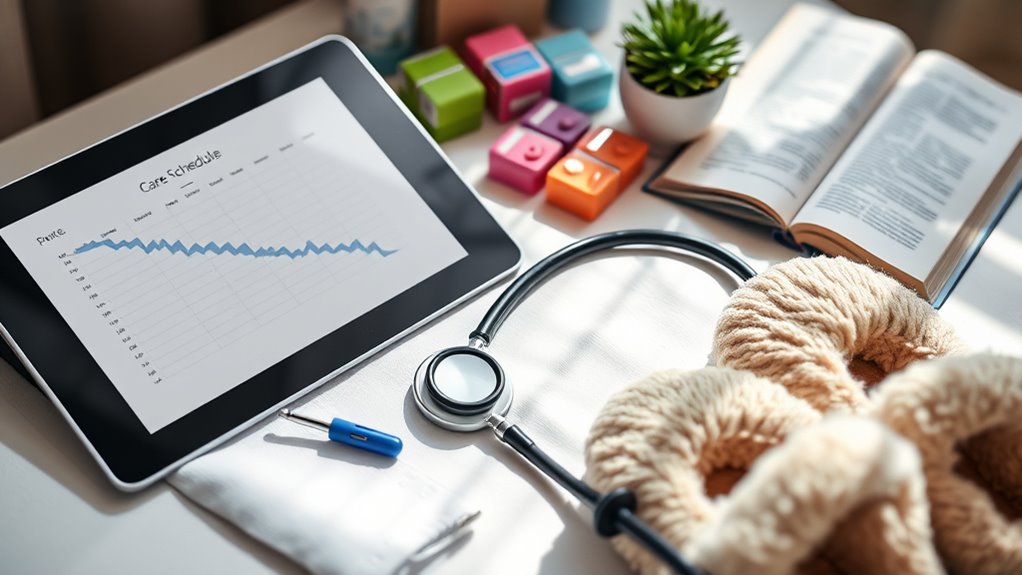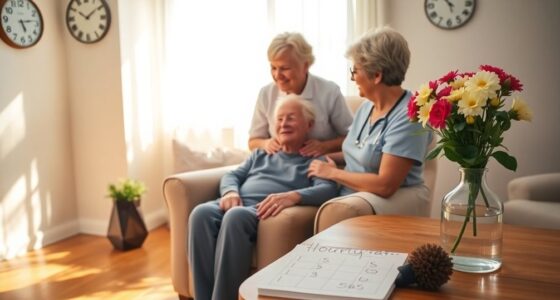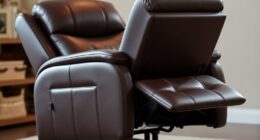As a caregiver, essential tools include digital safety devices like fall detectors, GPS trackers, and home sensors that alert you instantly to emergencies. Communication platforms such as video calls and emergency pendants help you stay connected and respond quickly. Medication management apps, scheduling tools, and organization platforms keep routines on track. High-tech assistive devices and online support networks boost independence and emotional resilience. Keep exploring to discover how these tools can make caregiving more effective and manageable.
Key Takeaways
- Remote monitoring devices like fall detectors, GPS trackers, and smart home sensors enhance safety and early health issue detection.
- Digital communication platforms and emergency response systems facilitate quick, organized support and real-time caregiver coordination.
- Assistive devices such as wearable fall detectors, medication dispensers, and voice assistants promote independence and safety.
- Digital care management apps streamline medication schedules, appointments, and caregiving tasks for better organization.
- Community support platforms and online forums provide emotional backing, resource sharing, and practical caregiving tips.
Digital Monitoring and Safety Devices
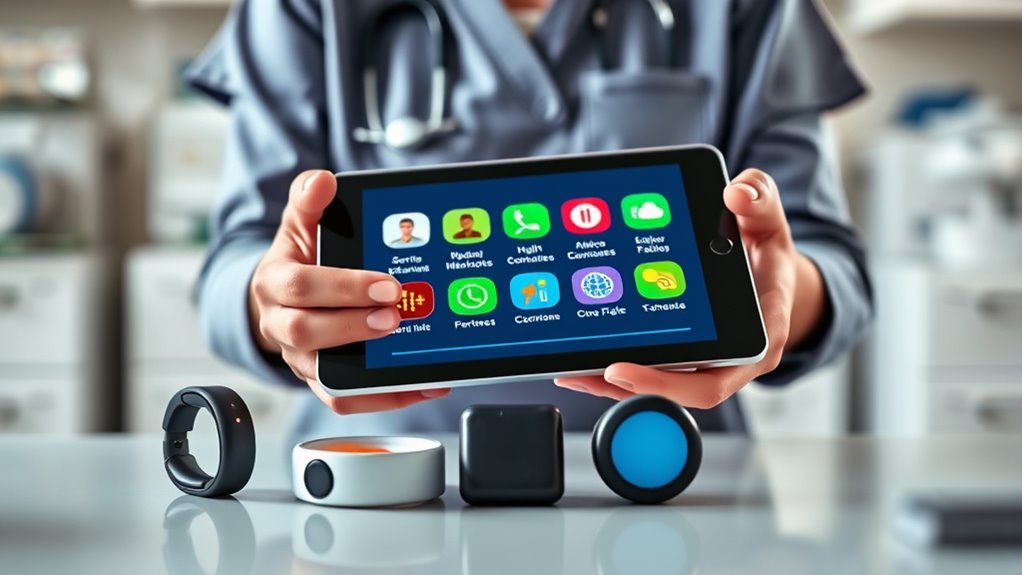
Have you ever wondered how technology can enhance safety for loved ones? Digital monitoring and safety devices make that possible. Fall detection wearables and home sensors automatically alert you or emergency services if a fall occurs or irregular activity is detected.
Digital safety devices alert you instantly to falls or unusual activity, keeping loved ones secure.
GPS tracking devices help keep loved ones’ real-time locations secure, making it easier to respond quickly if they wander or get lost. Video monitoring systems give you remote visual oversight, offering reassurance and quick intervention when needed.
Smart home sensors monitor critical signs, activity, and environmental conditions, catching health issues early. Emergency response systems, integrated with these devices, enable immediate help through one-button alerts or automatic fall detection.
These tools work together to improve safety and peace of mind for caregivers and families.
Communication and Emergency Response Tools
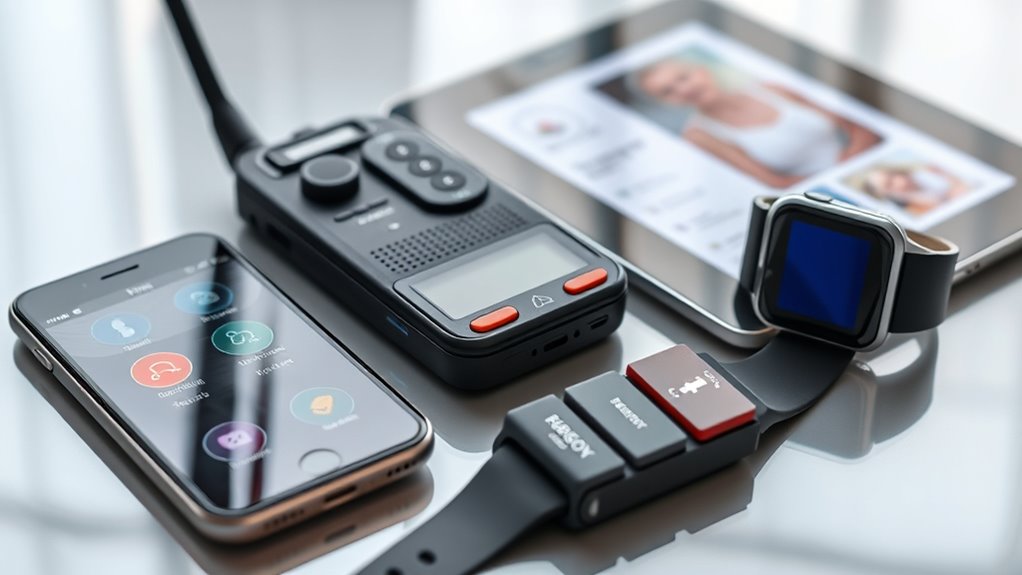
Communication and emergency response tools help you stay connected and guarantee prompt assistance in urgent situations. Devices like video call apps, GPS trackers, and emergency pendants make it easier to monitor your loved ones and respond quickly if needed. A family background understanding can also help tailor the right tools to fit individual needs better. Exploring these tools can give you peace of mind and improve safety for those who need it most. Incorporating sustainability practices into your safety tools can also reduce environmental impact and promote eco-friendly caregiving. Additionally, understanding regulations and safety standards ensures that the devices you choose comply with regional requirements and maintain high safety levels. Regularly evaluating the safety and storage of medical supplies and communication devices can further enhance your caregiving preparedness.
Real-Time Communication Devices
Ever wonder how caregivers stay connected and respond quickly in emergencies? Real-time communication devices make this possible. With video chat apps like FaceTime, Skype, and Zoom, you can see and talk to your loved ones, offering emotional support and visual monitoring. Emergency response devices, such as medical alert pendants, provide immediate help with one press or automatic fall alerts. Telecare systems use sensors to send real-time data on essential signs and activity, alerting you to potential issues. Building resilience and empathy in caregivers is crucial for effective response in high-pressure situations. GPS-enabled devices help track loved ones’ locations in real time. Two-way audio integrated into smart home devices allows quick communication for safety checks or medication reminders. Utilizing wall organization systems and aesthetic tools can also help maintain a safe, clutter-free environment that promotes ease of access during emergencies. Incorporating textile art techniques into home decor can create a soothing atmosphere and improve overall well-being for caregivers and loved ones alike. Additionally, understanding the hours of local stores can help plan shopping trips efficiently, ensuring necessary supplies are available when needed. Recognizing the importance of technological literacy can empower caregivers to make the most of these tools effectively.
Fall Detection & Alerts
Fall detection and alert tools build on the importance of real-time communication by providing immediate assistance when a fall occurs. With fall detection devices like wearable pendants or wristbands, you’ll receive automatic safety alerts that notify caregivers or emergency response teams instantly. Choosing the right device ensures compatibility with your existing safety systems and meets your specific needs. Smart home sensors can monitor for unusual inactivity or impacts, triggering alerts to guarantee prompt help. Advanced systems, such as Philips fall detectors, accurately differentiate between real falls and false alarms, reducing unnecessary notifications. Devices like the Apple Watch include discreet fall detection features that notify emergency contacts without manual input. Incorporating fall detection technology into your safety plan can significantly improve response times and help prevent serious injuries. Integrating fall detection with emergency response systems markedly shorten response times, helping to prevent serious injuries and ensuring swift assistance when every second counts. Incorporating lifesaving technology enhances safety protocols and provides peace of mind for caregivers and loved ones alike. A proper understanding of toilet flushing mechanisms can further optimize emergency preparedness and resource management in caregiving environments. Additionally, staying informed about angel numbers can serve as a source of reassurance and guidance during challenging times, reinforcing the importance of timely and attentive responses.
Medication and Appointment Management Solutions
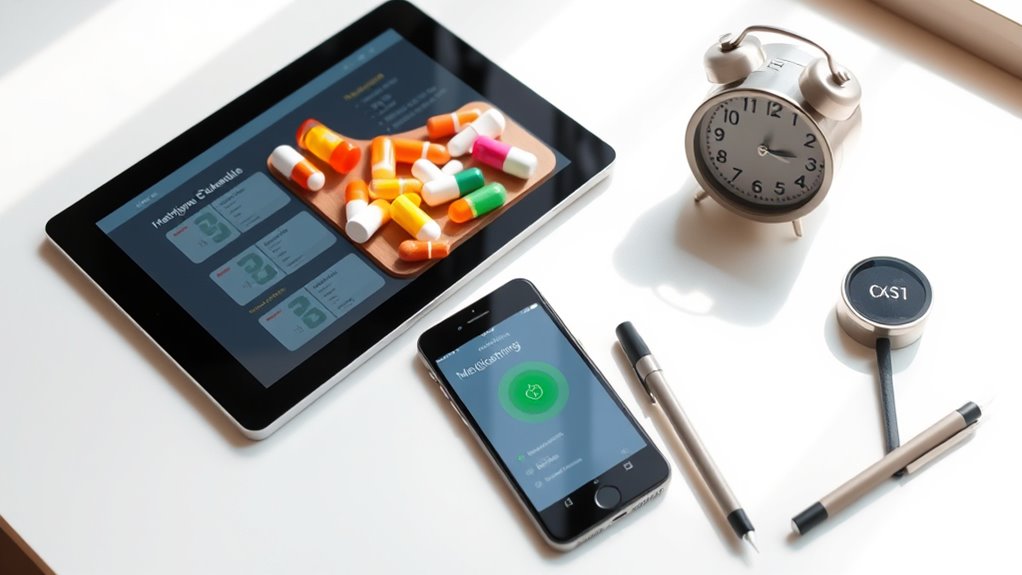
Effective medication and appointment management solutions are essential tools for caregivers seeking to guarantee their loved ones stay on track with their healthcare routines. Using medication management tools like pill organizers and automated dispensers ensures timely, accurate doses. Smartphone apps like MediSafe provide visual reminders and alert you when doses are missed or refills are needed. Digital scheduling platforms simplify appointment booking and send timely appointment reminders to both you and your loved one, reducing missed visits. Tracking features in medication apps allow you to monitor adherence, dosages, and medication history, offering better health oversight. Incorporating patient safety features into these tools can further enhance the quality of care provided. Additionally, integrating these tools with healthcare records can streamline information sharing and improve overall care coordination. Employing reminder alerts and notification systems can help ensure that no medication doses or appointments are overlooked, further supporting comprehensive care management. Regular updates and software security measures are vital to protect sensitive health information and maintain trust. Utilizing high contrast displays on mobile devices can improve visibility for caregivers managing multiple screens and notifications.
Caregiving Organization and Support Platforms
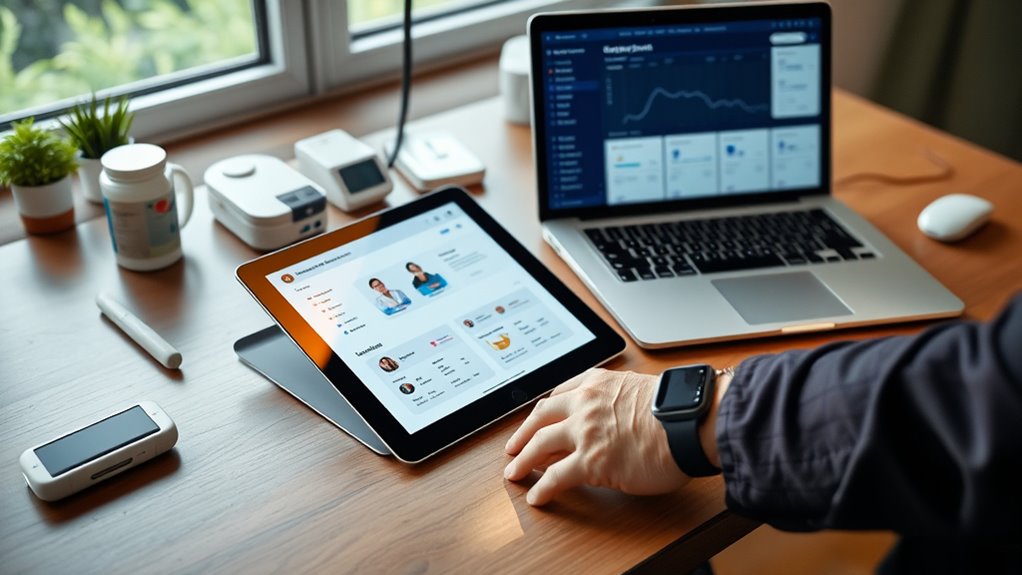
Caregiving organization and support platforms streamline the management of multiple responsibilities, ensuring you stay coordinated and informed. Caregiving organization platforms like CareZare centralize task management, appointment scheduling, and medication tracking, making it easier to oversee caregiving duties. Digital care calendars enable shared access among caregivers, providing timely reminders for routines and medical visits. Tasks management systems such as Trello or Todoist help you prioritize, delegate, and track tasks, reducing errors and missed responsibilities. Medication management tools organize prescriptions, set refill alerts, and log doses, promoting safety and adherence. Support platforms facilitate communication, emotional sharing, and resource exchange, helping you stay connected and reduce isolation. Incorporating Pimple Patch technology into your routine can also offer targeted skincare solutions, especially for managing skin issues that may arise during caregiving. Recognizing the spiritual guidance aspect of caregiving can help maintain emotional well-being and resilience during challenging times. Additionally, utilizing nutrient-rich tools and resources can further support both caregiver and recipient health. For example, hydrocolloid technology can aid in skin healing and protection. Employing privacy policies and secure communication channels within these platforms ensures your data remains protected, fostering trust and confidentiality. These tools work together to create a streamlined, efficient caregiving process, giving you confidence and peace of mind.
Community and Emotional Support Networks
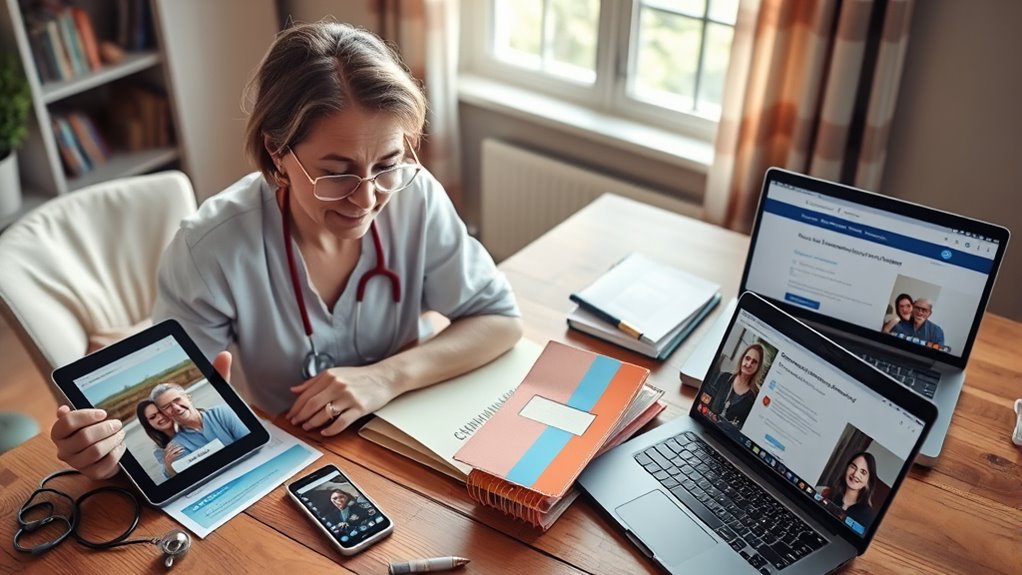
Caregivers often find that managing daily responsibilities can feel overwhelming, but connecting with community and emotional support networks can make a significant difference. Support groups and online communities give you a space to share experiences, advice, and emotional support, helping you feel less isolated. Building strong community networks enhances your mental well-being and creates a platform for sharing resources and practical tips. Participating in these networks helps you develop coping strategies and gain insights into managing caregiving challenges more effectively. Engaging with local support groups or online forums fosters a sense of belonging, reduces stress, and boosts resilience. By sharing resources and strategies within these networks, you contribute to collective problem-solving, ultimately improving your caregiving outcomes and emotional health. Additionally, understanding the importance of support networks can provide caregivers with critical access to specialized information and assistance tailored to their needs.
High-Tech Assistive Devices for Daily Living
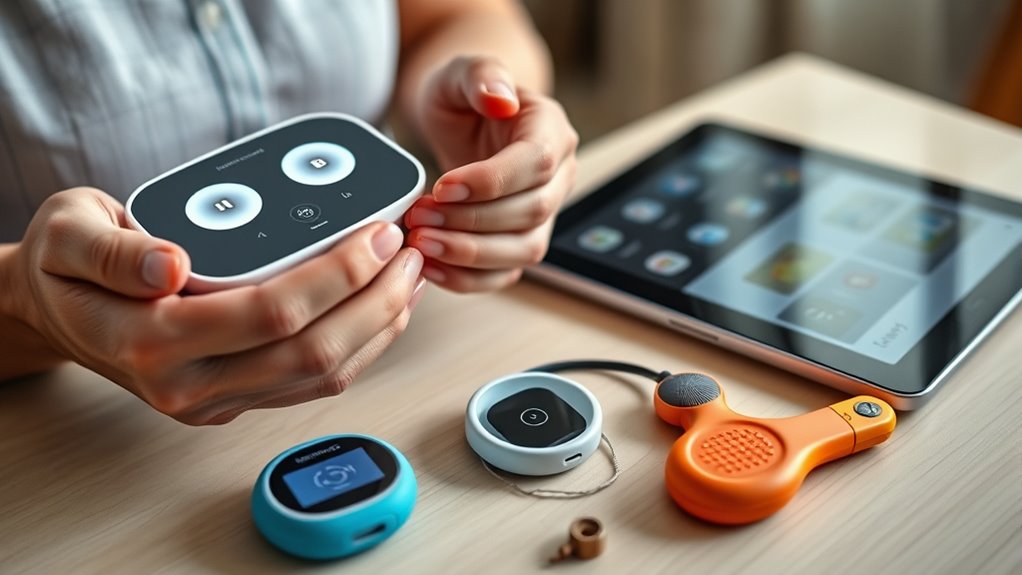
High-tech assistive devices are transforming daily living by promoting independence and safety for those who need support. These tools include medication reminders like automated pill dispensers that reduce errors and improve adherence.
High-tech assistive devices enhance independence and safety in daily life.
Safety devices such as wearable fall detection and motion sensors automatically alert you if an accident occurs or if there’s unusual inactivity, ensuring quick response.
Voice-activated digital assistants like Amazon Alexa or Google Assistant enable hands-free control of home devices, making daily routines easier.
Smart home automation systems, including automated lighting, thermostats, and security features, further support independence and safety in the home environment.
- Medication reminders and automated dispensers
- Wearable fall detection and motion sensors
- Voice-controlled assistants and smart home automation
- Nissan Tuning technologies can inspire innovative adaptations for assistive devices, enhancing their functionality and user experience.
Mobile Apps and Digital Resources for Caregivers
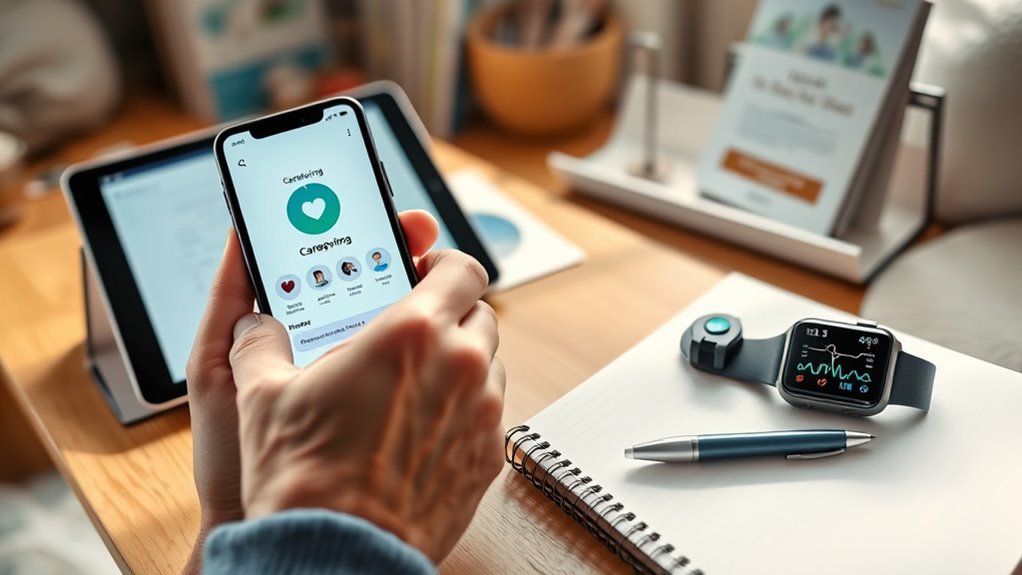
Mobile apps and digital resources empower you to manage caregiving tasks more efficiently with personalized features and remote monitoring tools.
They send real-time alerts for medication times, appointments, and safety issues, keeping you connected and informed.
Choosing user-friendly options that integrate with other health devices can make your caregiving routine smoother and more effective.
Personalized Care Apps
Have you ever wished for a way to streamline managing medications, appointments, and daily routines? Personalized care apps like MediSafe and CareZare make this easy.
They offer features such as:
- medication reminders to ensure doses aren’t missed
- tracking doses and managing refill schedules
- scheduling tools and shared calendars to coordinate appointments and routines
These apps help you stay organized and reduce stress by providing real-time updates and alerts.
Many also include journaling features, symptom logs, and communication platforms to share information with healthcare providers.
GPS tracking and emergency alerts enhance safety for at-risk individuals.
With customizable features, these apps adapt to your specific caregiving needs, making daily management more efficient and less overwhelming.
Remote Monitoring Tools
Remote monitoring tools, including mobile apps and digital resources, empower caregivers to oversee their loved ones’ safety and health from anywhere. Using sensors and activity tracking features, these tools provide real-time data on movement, behavior, and essential signs, helping you assess safety remotely.
Apps like CareZare and MediSafe let you schedule medications, set reminders, and log daily activities, ensuring your loved ones stay on track. GPS-enabled apps and devices facilitate quick location tracking, especially for those with dementia or mobility challenges, enhancing safety and peace of mind.
Additionally, data shared through these platforms allows healthcare professionals to review health trends and intervene promptly if needed. With remote monitoring tools, you maintain a proactive approach to caregiving, safeguarding your loved one’s well-being at all times.
Frequently Asked Questions
What Are the Digital Tools for Caregivers?
You ask about digital tools for caregivers, and there are many helpful options. You can use apps like MediSafe and CareZare to set medication reminders and track activities.
Medical alert systems like Lifeline and smartwatches provide emergency help and fall detection.
Video platforms like FaceTime and Zoom keep you connected with loved ones.
GPS devices and home monitoring systems help you guarantee safety and health from a distance.
What Are the Tools and Equipment Used in Caregiving 10?
Imagine a caregiving arsenal so powerful, it’s like having a superhero’s toolkit!
You use medication management devices to keep health on track, emergency alert systems to summon help instantly, and home sensors to monitor safety from afar.
Mobility aids support independence, while digital platforms organize every detail.
These tools combine to create a fortress of care, ensuring your loved ones stay safe, healthy, and supported every step of the way.
What Supplies Do Caregivers Need?
When you ask about supplies caregivers need, you’re focusing on the basics that support daily care. You’ll want to gather items like medication organizers, mobility aids, and hygiene products.
It’s also vital to have emergency supplies, such as first aid kits and safety equipment.
Additionally, keep comfort items like blankets and personal care supplies handy.
These essentials help you provide effective, compassionate care and guarantee safety and comfort for those you look after.
What Do Caregivers Need Most?
Imagine needing a superhero’s arsenal—now, that’s what caregivers require most. You need reliable communication tools to stay connected in emergencies, medication reminders to prevent health disasters, and remote sensors to monitor health without being everywhere at once.
Scheduling systems keep chaos at bay, and support networks lift your spirits. All these tools work together, transforming you into a superhero, ready to face any challenge with confidence and care.
Conclusion
By embracing these tools and technologies, you’re better equipped to navigate the caregiving journey. They help you stay organized, safe, and connected, making your efforts more effective and less overwhelming. Remember, when it comes to caregiving, a little tech can go a long way—you’re not alone in this. With the right support, you can turn challenges into opportunities to provide the best care possible, proving that every cloud has a silver lining.
